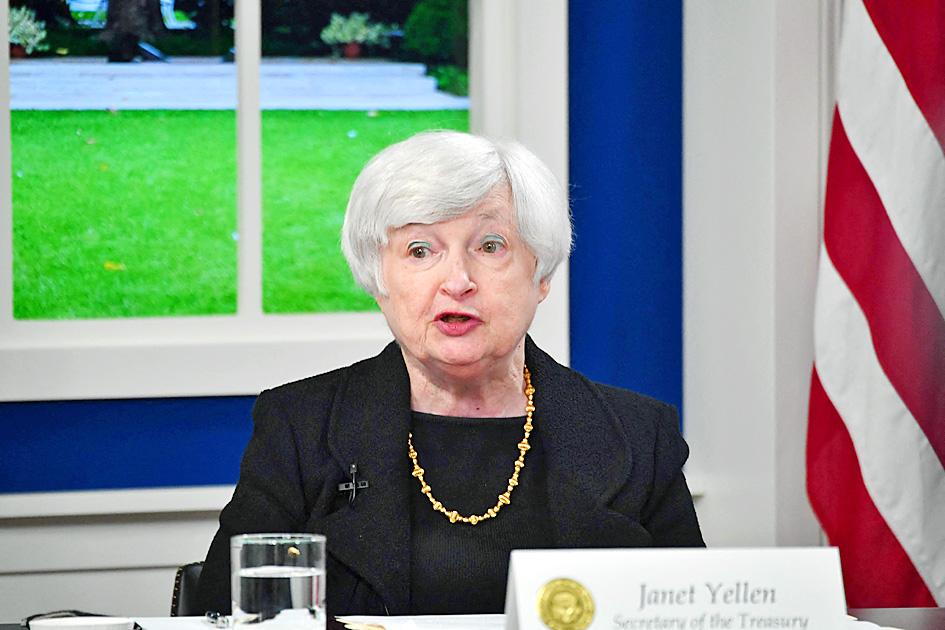US Secretary of the Treasury Janet Yellen said that she expects price increases to remain high through the first half of next year, but rejected criticism that the US risks losing control of inflation.
Inflation is expected to ease in the second half as issues ranging from supply bottlenecks, a tight US labor market and other factors arising from the COVID-19 pandemic improve, Yellen said on CNN’s State of the Union on Sunday.
The current situation reflects “temporary” pain, she said.

Photo: AFP
“I don’t think we’re about to lose control of inflation,” Yellen said, pushing back on criticism by former secretary of the Treasury Lawrence Summers this month. “Americans haven’t seen inflation like we have experienced recently in a long time, but as we get back to normal, expect that to end.”
On Friday, US Federal Reserve Chairman Jerome Powell sounded a note of heightened concern over persistently high inflation as he made clear that the central bank would begin tapering its bond purchases shortly, but remain patient on raising interest rates.
Powell said that policies are “well-positioned” to manage a range of outcomes.
Yellen declined to say how she has advised US President Joe Biden on his decision whether to reappoint Powell, but she said that financial regulation “markedly strengthened” under Powell’s term, as it did during hers and under her predecessor, Ben Bernanke.
As the pandemic added stress to the financial markets, “the core of our financial system did very well because of the improvements in capital liquidity, risk management, stress testing,” Yellen said.
“Those improvements have stayed in place during the Powell regime,” she added.
US business economists are slightly less optimistic about growth prospects over the next year, as a number of threats persist, ranging from higher-than-expected inflation to lingering disruptions from COVID-19 and snarled supply chains.
Yesterday, the National Association for Business Economics (NABE) released a new report showing that 66 percent of NABE members responding to a survey expect the US economy to grow by 3 percent to 5.9 percent over the next year, while 28 percent were less optimistic, pegging growth over the next year at a far slower 0.1 percent to 2.9 percent.
Those results represented a downturn from the previous survey in July, which showed an identical 66 percent who believed that growth would be 3 percent to 5.9 percent, but 20 percent of those surveyed expected growth to come in at an even stronger 6 percent to 8.9 percent.
In the new survey, no NABE member saw growth higher than the 3 percent to 5.9 percent range over the next year.
On Thursday, the US government is to release its first look at economic growth, as measured by GDP, for the July-to-September quarter.
Economists are forecasting that GDP grew in the US at an annual rate of about 3 percent in the third quarter, a marked slowdown from growth rates of 6.1 percent in the first quarter and 6.7 percent in the second quarter.
The slowdown has been attributed to a surge in cases from the Delta variant of SARS-CoV-2 over the summer and supply chain problems, which disrupted manufacturing output in many sectors, especially auto production, and helped send consumer prices rising at the fastest pace in 13 years.
The NABE survey, which was conducted from Oct. 6 to Oct. 14, obtained responses from 91 NABE members.
Additional reporting by AP

Intel Corp chief executive officer Lip-Bu Tan (陳立武) is expected to meet with Taiwanese suppliers next month in conjunction with the opening of the Computex Taipei trade show, supply chain sources said on Monday. The visit, the first for Tan to Taiwan since assuming his new post last month, would be aimed at enhancing Intel’s ties with suppliers in Taiwan as he attempts to help turn around the struggling US chipmaker, the sources said. Tan is to hold a banquet to celebrate Intel’s 40-year presence in Taiwan before Computex opens on May 20 and invite dozens of Taiwanese suppliers to exchange views

Application-specific integrated circuit designer Faraday Technology Corp (智原) yesterday said that although revenue this quarter would decline 30 percent from last quarter, it retained its full-year forecast of revenue growth of 100 percent. The company attributed the quarterly drop to a slowdown in customers’ production of chips using Faraday’s advanced packaging technology. The company is still confident about its revenue growth this year, given its strong “design-win” — or the projects it won to help customers design their chips, Faraday president Steve Wang (王國雍) told an online earnings conference. “The design-win this year is better than we expected. We believe we will win

Chizuko Kimura has become the first female sushi chef in the world to win a Michelin star, fulfilling a promise she made to her dying husband to continue his legacy. The 54-year-old Japanese chef regained the Michelin star her late husband, Shunei Kimura, won three years ago for their Sushi Shunei restaurant in Paris. For Shunei Kimura, the star was a dream come true. However, the joy was short-lived. He died from cancer just three months later in June 2022. He was 65. The following year, the restaurant in the heart of Montmartre lost its star rating. Chizuko Kimura insisted that the new star is still down

While China’s leaders use their economic and political might to fight US President Donald Trump’s trade war “to the end,” its army of social media soldiers are embarking on a more humorous campaign online. Trump’s tariff blitz has seen Washington and Beijing impose eye-watering duties on imports from the other, fanning a standoff between the economic superpowers that has sparked global recession fears and sent markets into a tailspin. Trump says his policy is a response to years of being “ripped off” by other countries and aims to bring manufacturing to the US, forcing companies to employ US workers. However, China’s online warriors